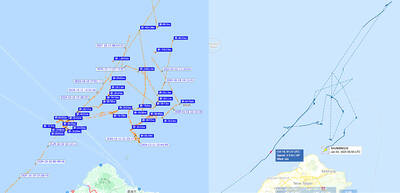Retired lieutenant colonel Tu Yung-hsin (杜永心), who was convicted of contravening the National Security Act (國家安全法), has lost his appeal to the Taipei High Administrative Court, after a lower court removed his retirement pension.
Tu retired from active service in 1994 and went to China to start a business, where he met and befriended a member of China’s Central Military Commission surnamed Luo (羅), the court filing said.
Luo enticed Tu with financial rewards to set up a spy network in Taiwan, where he would access classified information and pass it on to Luo, it said.

Photo: Taipei Times file
After Tu returned to Taiwan in October 2011, he began recruiting people for the spy network and approached a lieutenant colonel surnamed Tsai (蔡), a section chief at an army combat unit, they said.
Tu offered Tsai NT$200,000 (US$6,174 at the current exchange rate), expensive foreign brand alcohol, top-grade tea gift packs and an all-expenses paid trip, the ruling said, adding that Tu even arranged for an overseas trip to meet Luo.
“Tsai was told to swear loyalty to China during the meeting with Luo, and to sign a pledge that if a war breaks out in the Taiwan Strait, Tsai and his unit would not fight nor put up any resistance against enemy forces,” the filing said.
Prosecutors charged Tu with developing a spy network and contravening the National Security Act.
Meanwhile, Tsai was not charged, since he returned the cash and the gifts, recorded their conversations and gave it to prosecutors as evidence.
The New Taipei City District Court found Tu guilty in 2020 and sentenced him to four years in prison. He filed an appeal, but the Supreme Court upheld the verdict in 2022. Tu is in prison, serving his sentence.
The Taipei High Administrative Court also rejected Tu’s appeal regarding his pension, saying that the Ministry of National Defense has ruled that Tu no longer has a right to a military pension. As part of the verdict handed down in 2022, Tu was required to return the pension paid to him for 11 years.

DEEPER REVIEW: After receiving 19 hospital reports of suspected food poisoning, the Taipei Department of Health applied for an epidemiological investigation A buffet restaurant in Taipei’s Xinyi District (信義) is to be fined NT$3 million (US$91,233) after it remained opened despite an order to suspend operations following reports that 32 people had been treated for suspected food poisoning, the Taipei Department of Health said yesterday. The health department said it on Tuesday received reports from hospitals of people who had suspected food poisoning symptoms, including nausea, vomiting, stomach pain and diarrhea, after they ate at an INPARADISE (饗饗) branch in Breeze Xinyi on Sunday and Monday. As more than six people who ate at the restaurant sought medical treatment, the department ordered the

A strong continental cold air mass and abundant moisture bringing snow to mountains 3,000m and higher over the past few days are a reminder that more than 60 years ago Taiwan had an outdoor ski resort that gradually disappeared in part due to climate change. On Oct. 24, 2021, the National Development Council posted a series of photographs on Facebook recounting the days when Taiwan had a ski resort on Hehuanshan (合歡山) in Nantou County. More than 60 years ago, when developing a branch of the Central Cross-Island Highway, the government discovered that Hehuanshan, with an elevation of more than 3,100m,

Taiwan’s population last year shrank further and births continued to decline to a yearly low, the Ministry of the Interior announced today. The ministry published the 2024 population demographics statistics, highlighting record lows in births and bringing attention to Taiwan’s aging population. The nation’s population last year stood at 23,400,220, a decrease of 20,222 individuals compared to 2023. Last year, there were 134,856 births, representing a crude birth rate of 5.76 per 1,000 people, a slight decline from 2023’s 135,571 births and 5.81 crude birth rate. This decrease of 715 births resulted in a new record low per the ministry’s data. Since 2016, which saw

SECURITY: To protect the nation’s Internet cables, the navy should use buoys marking waters within 50m of them as a restricted zone, a former navy squadron commander said A Chinese cargo ship repeatedly intruded into Taiwan’s contiguous and sovereign waters for three months before allegedly damaging an undersea Internet cable off Kaohsiung, a Liberty Times (sister paper of the Taipei Times) investigation revealed. Using publicly available information, the Liberty Times was able to reconstruct the Shunxing-39’s movements near Taiwan since Double Ten National Day last year. Taiwanese officials did not respond to the freighter’s intrusions until Friday last week, when the ship, registered in Cameroon and Tanzania, turned off its automatic identification system shortly before damage was inflicted to a key cable linking Taiwan to the rest of